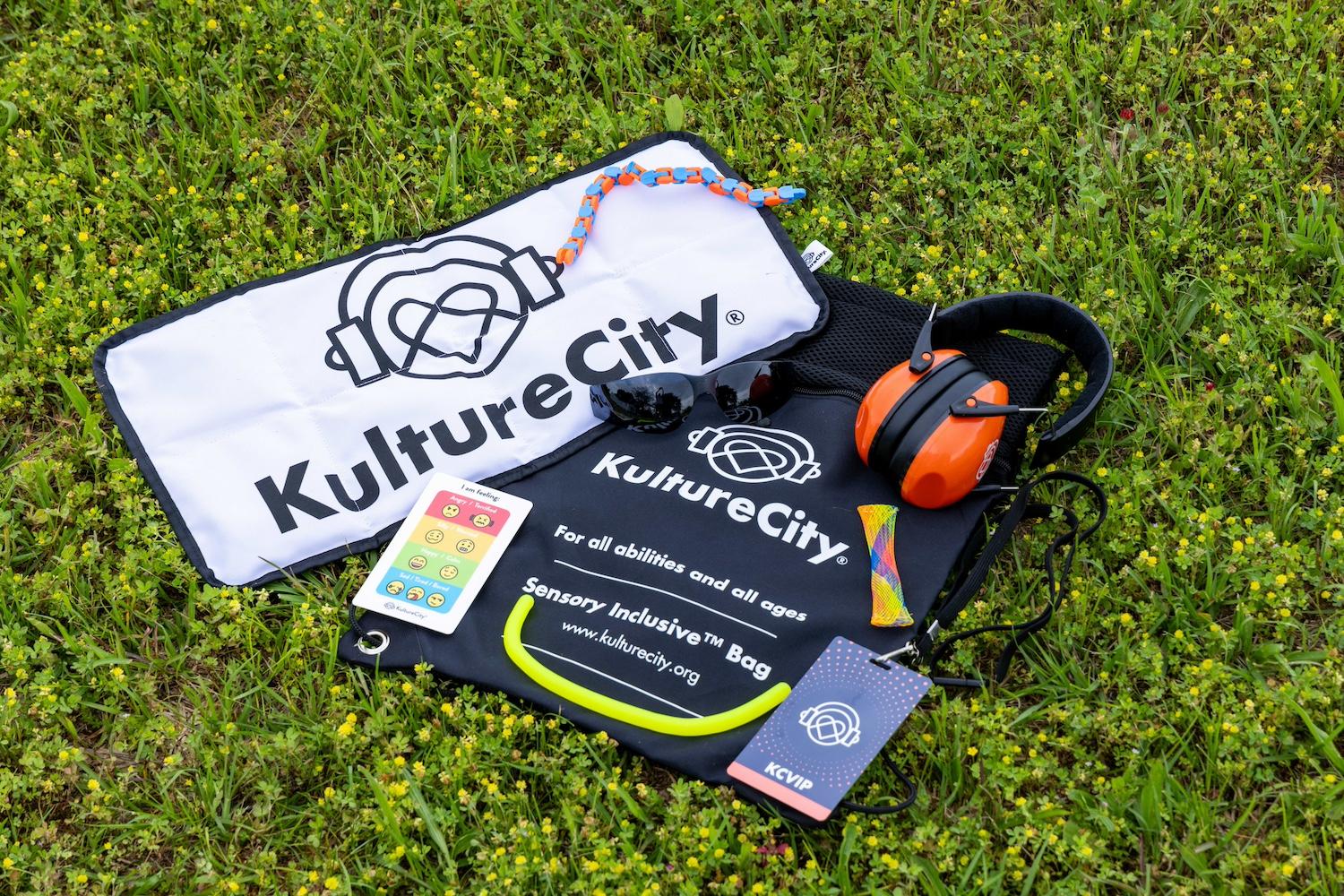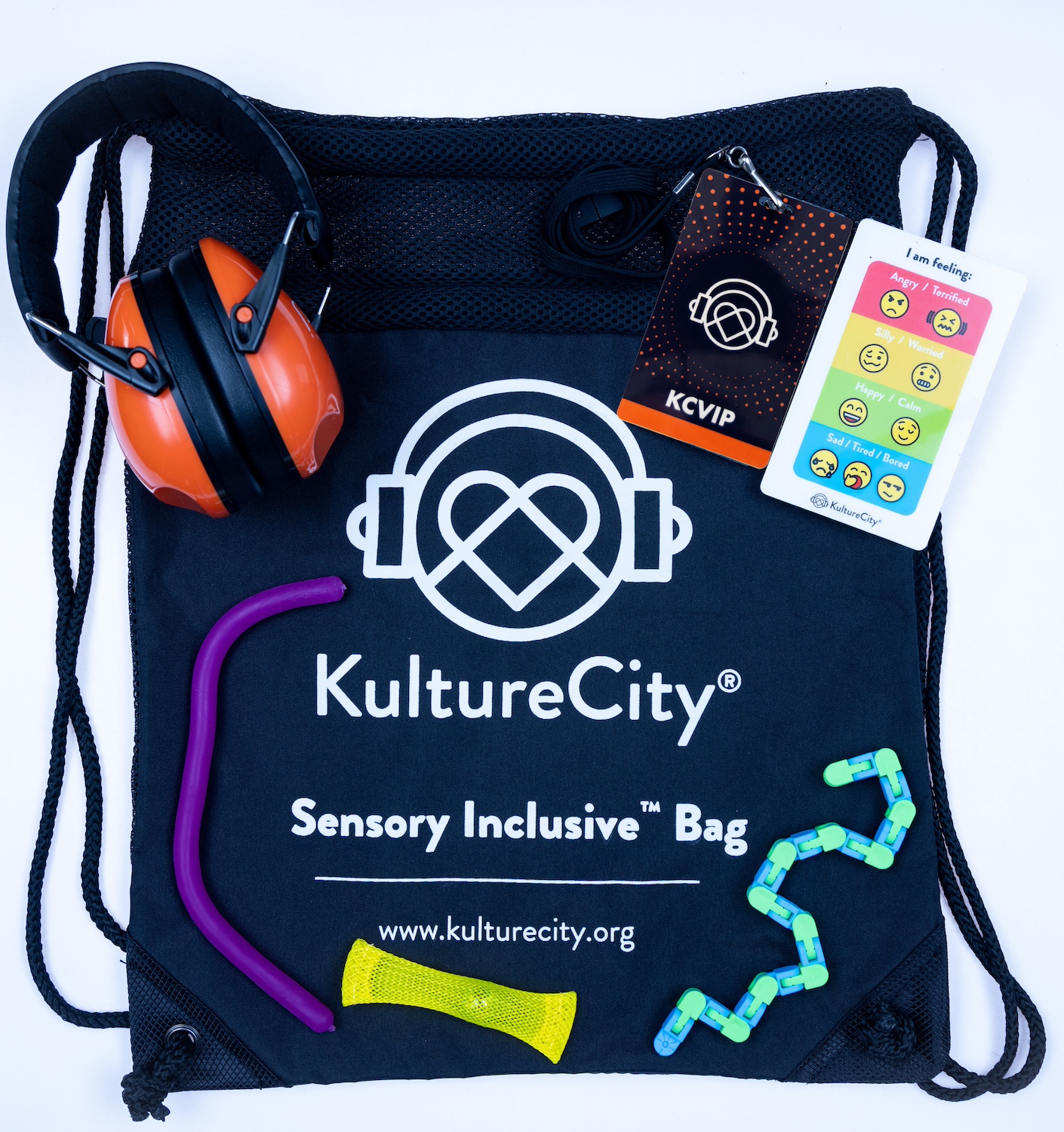
KultureCity's sensory inclusive bags include fidget toys, strobe reduction glasses, a communication cue-card depicting different emotions and noise-reduction headphones. (Image courtesy of KultureCity.)
Bright flashing lights, pounding bass, ear-splitting guitar licks, hundreds of humans jam-packed into an arena, shouting, swaying, and dancing to their favorite songs — the excitement at concerts and live events is palpable. But it can also be overwhelming for those with sensory processing differences. A new partnership between the sensory accessibility nonprofit KultureCity and venue operator Live Nation is making these kinds of events more inclusive at 25 venues across North America.
“Our goal is to work with folks like Live Nation to allow individuals to have that experience, to enjoy a concert, to enjoy an event, so there isn't that level of social isolation involved,” Uma Srivastava, executive director at KultureCity, told TriplePundit.
If a group of friends wants to go to a concert together, for example, but one of them faces difficulties processing and responding to sensory information like sights, sounds, smells, tastes, or touch, that person might have to stay home. Not only would their enjoyment of the event be limited to photos or videos, but they might feel left out hearing about the experience after the fact.
“Unfortunately, this level of social isolation is something our families, our adults, feel day in and day out,” Srivastava said. That’s where KultureCity’s sensory inclusive certification comes in. “It really allows families to go together. It allows a group of adult friends to go together and know that there are tools in place to support anybody and everybody who might have a sensory need.”
The sensory inclusive certification
So far, 25 Live Nation venues in the United States and Canada earned sensory inclusive certifications, with nine more set to be certified in the fall, Kate Lieberman, head of fan services at Live Nation, told 3p.
The certification means the sites meet standards like annual training and certification for staff, sensory inclusive bags equipped with tools for dealing with sensory overwhelm, online communication that explains what to expect, clear signage, and quiet spaces to decompress if the sensory experiences become too much. The staff training, which is developed by medical professionals in cooperation with people who are neurodivergent, gives public-facing employees the skills they need to support event-goers with sensory differences, Lieberman said.
“This thing called the social story, it really allows for fans to understand every single touch point they may come in contact with at a venue prior to ever arriving,” Lieberman said. Unique to each venue, social stories detail different rooms and interactions with a step-by-step explanation and photos. They can be accessed through KultureCity’s app or by visiting the list of venues on their website
“It's just allowing for education and empowerment before they even come on site, so they know what they're walking into. They know what they can experience," Lieberman said. "They know that there are [sensory] bags available to them. That there are quiet areas available to them should they need to remove themselves for a few minutes.”
KultureCity’s sensory inclusive bags include strobe reduction glasses capable of filtering out pyrotechnics and other lighting effects, a selection of three fidget tools that allow users to choose the right texture for them, a visual cue-card for communicating needs with staff and noise-reducing headphones. They can be checked out for free and were created to be disinfected and reused, keeping waste, storage space and costs down, Srivastava said.

One million sensory bags and counting
“In just the last 10 years … we have been able to provide over a million sensory bags at events, organizations, and special shows,” Srivastava said. “This just shows that the demand is there for this type of support.”
For Live Nation events, specifically, the venues received a lot of positive feedback in comments, photos and social media posts, Lieberman said. The experience was especially meaningful for children who are able to attend their first concerts thanks to the sensory accommodations.
“We don't want anyone to not be able to have that unbelievable feeling and excitement that comes with that first memory,” Lieberman said. “Knowing that we are making it more possible in our partnership with KultureCity, it just brings all of us tremendous pride and joy.”
That same pride is echoed by frontline staff, who say they value the tools and training they receive as part of the certification, she said. Trained staff are integral to making sensory accommodations work, Srivastava said, recalling a young girl who started to become overwhelmed at Rogers Stadium in Toronto, Canada.
“The staff immediately saw the need. They provided the family with a sensory bag, and they got to enjoy the concert,” she said. “The dad shared a little video clip … It's these experiences that really fuel us to say, ‘Let's continue to innovate, and let's continue to explore sensory sensitivities.’”
KultureCity recognizes that sensory experiences vary from day to day and from person to person, so there will always be some level of unmet need, Srivastava said. It plans to continue improving its approach by filling in as many gaps as possible.
“We're here to serve the special needs, the sensory needs community, alongside phenomenal partners who really ensure that they allow concerts and performances for all, not just a limited few,” Srivastava said.

Riya Anne Polcastro is an author, photographer and adventurer based out of Baja California Sur, México. She enjoys writing just about anything, from gritty fiction to business and environmental issues. She is especially interested in how sustainability can be harnessed to encourage economic and environmental equity between the Global South and North. One day she hopes to travel the world with nothing but a backpack and her trusty laptop.














